Related Research Articles

Roger William Corman was an American film director, producer and actor. Known under various monikers such as "The Pope of Pop Cinema", "The Spiritual Godfather of the New Hollywood", and "The King of Cult", he was known as a trailblazer in the world of independent film.

Bruce Beresford is an Australian film director, opera director, screenwriter, and producer. He began his career during the Australian New Wave, and has made more than 30 feature films over a 50-year career, both locally and internationally in the United States. He is a two-time Academy Award nominee, and a four-time AACTA/AFI Awards winner out of 10 total nominations
Filmmaking or film production is the process by which a motion picture is produced. Filmmaking involves a number of complex and discrete stages, beginning with an initial story, idea, or commission. Production then continues through screenwriting, casting, pre-production, shooting, sound recording, post-production, and screening the finished product before an audience, which may result in a film release and exhibition. The process is nonlinear, as the director typically shoots the script out of sequence, repeats shots as needed, and puts them together through editing later. Filmmaking occurs in a variety of economic, social, and political contexts around the world, and uses a variety of technologies and cinematic techniques to make theatrical films, episodic films for television and streaming platforms, music videos, and promotional and educational films.

Tommy is a 1975 British musical fantasy drama film written and directed by Ken Russell and based on the Who's 1969 rock opera album of the same name about a "psychosomatically deaf, mute, and blind" boy who becomes a pinball champion and religious leader. The film featured a star-studded ensemble cast, including the band members themselves, Ann-Margret, Oliver Reed, Eric Clapton, Tina Turner, Elton John, Robert Powell and Jack Nicholson.

Phillip Noyce is an Australian film and television director. Since 1977, he has directed over 19 feature films in various genres, including historical drama ; thrillers ; and action films. He has also directed the Jack Ryan adaptations Patriot Games (1992) and Clear and Present Danger (1994), as well as the 2014 adaptation of Lois Lowry's The Giver.
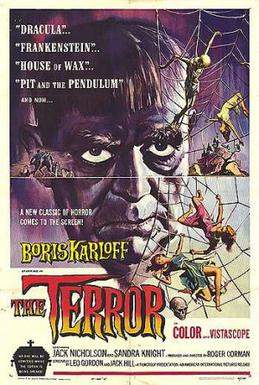
The Terror is a 1963 American independent horror film produced and directed by Roger Corman. The film stars Boris Karloff and Jack Nicholson, the latter of whom portrays a French officer who is seduced by a woman who is also a shapeshifting devil.
Homicide was a landmark Australian television police procedural drama series broadcast on the Seven Network and produced by Crawford Productions. It was the television successor to Crawfords' radio series D24. The "Consummate Homicide cast" includes the four characters that are the best known: Det. Snr. Sgt. David "Mac" MacKay, Det. Sgt. Peter Barnes, Inspector Colin Fox and Sen. Det. Jim Patterson.

Little Boy Lost is a 1978 Australian drama film starring Nathan Dawes as Stephen Walls, John Hargreaves as Jacko Walls, Lorna Lesley as Dorrie Walls, Tony Barry as Constable O'Dea and Steve Dodd as William Stanley, the Aboriginal tracker. The spelling of Steven Walls’s name was changed to “Stephen” in the movie.

Frederic Alan Schepisi is an Australian film director, producer and screenwriter. His credits include The Chant of Jimmie Blacksmith, Plenty, Roxanne, A Cry in the Dark, Mr. Baseball, Six Degrees of Separation, and Last Orders.

Universal Soldier is a 1971 film directed by Cy Endfield and starring George Lazenby as a mercenary. It was the final film of Endfield, who also has an acting role in it. The title came from the 1964 song of the same name by Buffy Sainte-Marie.
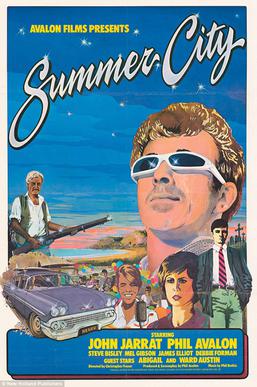
Summer City is a 1977 Australian drama thriller film, filmed in Newcastle, Australia. It marked Mel Gibson's film debut.

Night Mail is a 1936 British documentary film directed and produced by Harry Watt and Basil Wright, and produced by the General Post Office (GPO) Film Unit. The 24-minute film documents the nightly postal train operated by the London, Midland and Scottish Railway (LMS) from London to Scotland and the staff who operate it. Narrated by John Grierson and Stuart Legg, the film ends with a "verse commentary" written by W. H. Auden to a score composed by Benjamin Britten. The locomotive featured in the film is LMS Royal Scot Class 6115 Scots Guardsman.
Phillip Avalon is an Australian writer, producer, director and actor of films and TV.

Terry Christopher Bourke was an Australian journalist, screenwriter, producer and director.
The Golden Cage is a 1975 Australian film about two Turkish migrants in Australia directed by Ayten Kuyululu and produced by her husband Ilhan Kuyululu, who also acted in the film. It was the first Australian film directed by a woman since the 1930s.
Breaking Loose is a 1988 Australian film. It was a sequel to Summer City (1977).
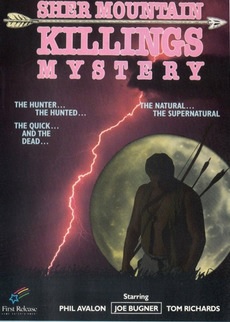
Sher Mountain Killings Mystery is a 1990 Australian film directed by Vince Martin and Phillip Avalon. This film is categorized as an "Ozploitation" horror film. The synopsis for this film is “Nobody trusted that the Gem has mysterious power. From thieves’ perspectives, it was just another jewel. But not everything is as it appears .’ The film differentiate itself from other horror film with the concepts such as Old Ranger’s castle, cursed stone and Mysterious power which adds more Australianness tone to the film.
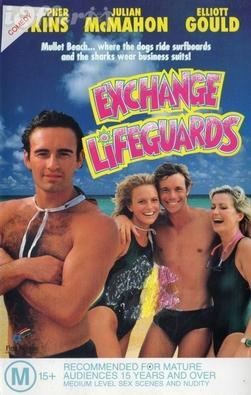
Exchange Lifeguards known in the United States as Wet and Wild Summer!, is a 1992 Australian-American comedy film directed by Maurice Murphy and starring Christopher Atkins, Julian McMahon and Elliott Gould.
The Finder is a 2001 Australian film.
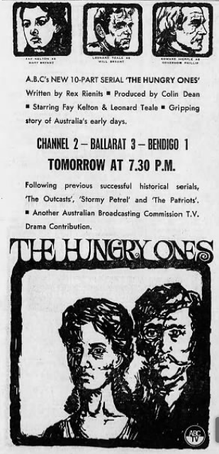
The Hungry Ones was an Australian television mini-series. It was a period drama about a pair of husband and wife convicts trying to go straight, consisting of 10 30-minute black-and-white episodes, which aired on ABC. Unlike previous serials it was videotaped rather than performed live to camera.
References
- ↑ Scott Murray, Australia on the Small Screen 1970–1995, Oxford Uni Press, 1996 p. 46
- 1 2 3 4 Avalon, Phil (2015). From Steel City to Hollywood. New Holland. pp. 117–121.
- ↑ Double Dealer at National Film and Sound Archive
- ↑ "Walsh gets contract as recording star". The Sydney Morning Herald. 11 May 1975. p. 84.